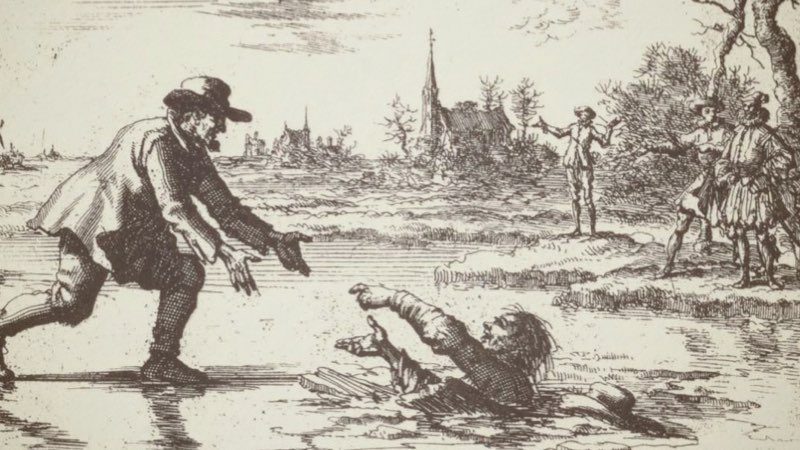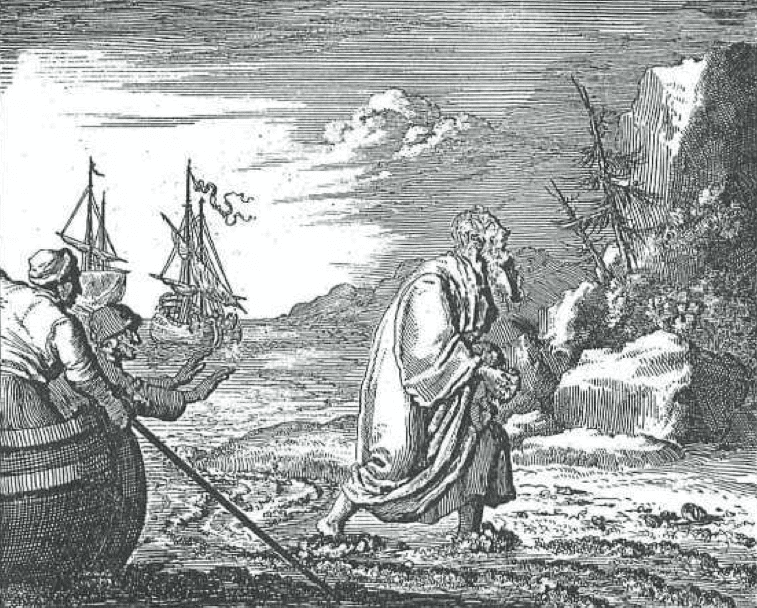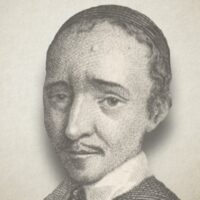
46. John the Evangelist
John the evangelist abandoned on the Isle of Patmos, A.D. 97
John, The Holy Evangelist, Banished To The Isle of Pathos, By Emperor Domitian, A.D. 97
John, the apostle and evangelist, was a son of Zebedee, and brother of James the Greater; he was born at Nazareth, and by occupation was a fisherman. Matt. 4:21. He was called by Christ, when engaged with his father and brother in mending their nets for fishing. Verse 22. As soon as he heard the words of Christ, he immediately left the nets, the ship, and his father, and, together with James, his beloved brother, followed Christ. Chrysost. Ilomil. 1., in Joh.
Afterwards he became from a disciple an apostle of Christ, and was numbered with the twelve whom the Lord had specially chosen for His service. Matt. 10:2.
He was greatly beloved by the Lord, so that at the Supper he reclined on Christ’s bosom, and leaned, or rested, on His breast. John 13:23; 21:20. The Lord, moreover, had accepted him as one of His three most special friends, to bear testimony of His works, not only in His conflict and suffering in the garden of Gethsemane, but also in His glory, in the raising of the daughter of Jairus as well as in the showing forth of His majesty, when, on the holy mount, His face shone as the sun, and His raiment became white as the light. Matt. 26:36; Luke 8:51; Matt. 17:1-4.
From an inward love, he followed the Lord not only into the house of the priest Caiaphas, but also to Mount Calvary, without the city of Jerusalem, where the Lord was put to death. There the Lord, hanging on the cross, addressed him, saying, “Son, behold thy mother!” (John 19:27).
He was so eager after the resurrection of Christ, that in running to His grave with his fellow apostle Peter, he outran the latter, thus showing his affection for his Lord, who had died an ignominious death, and was entirely forsaken by His other friends. John 20:4.
Some years afterwards, in order to refute the errors of Ebion and Cerinthus, who denied the divinity of Christ, he wrote his Gospel, to the honor and magnifying of His Saviour, commencing thus:
“In the beginning was the Word, and the Word was with God, and the Word was God. The same was in the beginning with God. All things were made by him; and without him was not anything made that was made.” “And the Word was made flesh,” etc., John 1:1-14. In these words he gives us to understand the true incarnation of the Son of God, to whom be praise and glory forever. Amen.
John is called through the Gospel the beloved of the Lord, or the disciples “whom Jesus loved;” because the Lord so especially loved him. John 13:23; 20:2; 21:20.
But since it is the will of God to bring His children to glory through much tribulation and distress, this beloved friend of God, John, also could not escape, but was tried throughout his life, with manifold tribulations, according to what the Lord had told him and his brother James: “Ye shall indeed drink of the cup that I drink of; and with the baptism that I am baptized withal shall ye be baptized,” that is, ye shall also be subjected to my suffering and distress. Mark 10:39.
This was afterwards fulfilled in him in manifold ways; for, besides what ancient writers have recorded concerning it, namely, that at Rome he was put into a vat full of boiling oil, but was miraculously delivered out of it, the merits of which account we leave unquestioned; this much, according to the Scriptures, is certain, namely that he spent a long time on the desert island of Patmos, whither he had been banished, for the testimony of Jesus Christ. Concerning this, John himself makes this declaration, Rev. 1:9: “I, John, who also am your brother and companion in tribulation, and in the kingdom and patience of Jesus Christ, was in the isle Patmos, for the word of God, and for the testimony of Jesus Christ.”
But by whom, and in what manner he was banished to that desert island, is not stated in the Scriptures, except that he was in tribulation for the Word of God. Some of the ancient writers however, state that he was banished by Emperor Domitian, about A. D. 97; who, in his wrath and displeasure, because he preached the Word of God, and confessed Christ as the Son of God, had him sentenced and banished thither.
On this island, which lies in the Mediterranean, between Asia Minor and Greece, one hundred and twenty-five miles north-westward of Jerusalem, he was indeed forsaken of men, and had scarcely any companionship, aside from poisonous and noxious animals, which dwelt in the place; nevertheless, the Lord Cod dwelt with him with His heavenly consolation, and during his banishment presented and revealed to him, very beautiful scenes and glorious visions concerning the condition of the church of God to the end of the world.
How he wrote his Apocalypse or Revelation, an excellent book, full of divine and truthful prophecies, taken from the preceding visions and heavenly sights; some of which are already fulfilled, and others remain to be fulfilled.
As the time of his deliverance began to draw nigh, the Lord spoke to him on this island, saying, “Behold, I come quickly, Amen.” Whereupon John replied with a well comforted soul, “Even so come, Lord Jesus.” Rev. 22 :20.
When the Emperor Domitian, who had banished him to the aforesaid island, was dead, and Nerva reigned in his stead, he was delivered and brought back to Ephesus, where he had previously been bishop of the church. This occurred, according to history, about A. D. 99; consequently, his confinement there lasted two years. The ancients write that he suffered much yet for the name of Christ, and was compelled to drink poison, yet remained unharmed, according to the promise of Christ; and that he finally died in peace at Ephesus, in the time of the Emperor Trajan, having served in the holy Gospel for fifty-one years, and being eighty years old: and thus this great light rests in Asia. Joh. Gys. Hist. Mart., fol. 14, col. 2, rom Euseb. Hist. Reel, mid Epiphanio., Joh. Gys., ibidem, from Euscb., lib. 3, cap. 20, 23, Niceph, lib. 3, cap. 4, Ircn., lib. 3, cap. 3. Also, Konst-tooneel, in the life of John. Also, Bybelsch Ncembceck, letter J. on the name John, fol. 538, col. 2, and fol. 539, col. 1,2, also, fol. 540, col. 1.
Thieleman J. Van Braght (1625-1664) was an Anabaptist who is best known for writing a history of the Christian witness throughout the centuries entitled “The Bloody Theater or Martyrs Mirror of the Defenseless Christians who baptized only upon confession of faith, and who suffered and died for the testimony of Jesus, their Saviour, from the time of Christ to the year A.D. 1660” (1660).
Thieleman J. Van Braght, Martyrs Mirror





